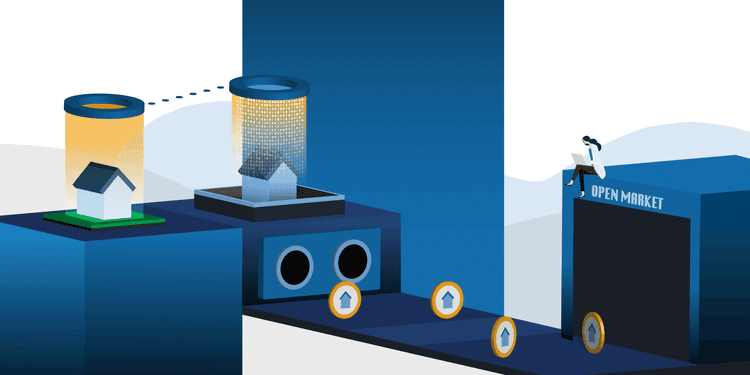
BEGINNER’S GUIDE
by: Towqeer gilkar

Tokenization of Assets: Bringing Real-World Assets onto the Blockchain
In recent years, blockchain technology has extended its reach beyond the realm of digital currency, moving into the tokenization of real-world assets. This innovative process involves converting rights to an asset into a digital token on a blockchain. The tokenization of assets like real estate, art, commodities, and even intellectual property is transforming how these assets are bought, sold, and managed. This article delves into the concept of asset tokenization, exploring its mechanisms, benefits, challenges, and potential impacts on various industries.
Understanding Asset Tokenization
Asset tokenization refers to the process of issuing a blockchain token (a digital representation) that legally represents an asset or a share of an asset. These tokens can be traded and stored on a blockchain, providing a digital record of ownership. They are often referred to as security tokens and are subject to regulatory compliance.
How It Works
- Asset Selection: An asset is chosen for tokenization. This could be a physical asset (like real estate) or an intangible one (like shares in a company).
- Issuance of Tokens: The asset's value is divided into tokens, which represent a share of the asset. These tokens are created and stored on a blockchain.
- Regulatory Compliance: Legal frameworks are established to ensure the tokenization process complies with relevant laws and regulations.
- Trading on Secondary Markets: Tokens can be bought and sold on secondary markets, providing liquidity and accessibility to investors.
Benefits of Tokenization
Improved Liquidity
- Access to Broader Markets: Tokenization can turn traditionally illiquid assets like real estate into liquid investments, accessible to a broader range of investors.
- Fractional Ownership: It allows for fractional ownership, enabling investment in expensive assets with smaller amounts of money.
Enhanced Transparency and Security
- Immutable Record: Blockchain provides an immutable, transparent ledger of transactions and ownership.
- Reduced Fraud Risk: The immutability of blockchain reduces the risk of fraud and errors in asset management.
Cost Efficiency
- Lower Transaction Costs: Tokenization can reduce the costs associated with buying and selling assets by eliminating intermediaries.
- Streamlined Processes: Automating asset management processes through smart contracts can further reduce costs and increase efficiency.
Challenges and Considerations
Regulatory Hurdles
- Legal Framework: The legal framework for tokenized assets is still evolving, posing challenges in terms of compliance and enforcement.
- Jurisdictional Variations: Laws and regulations regarding tokenization can vary greatly between jurisdictions.
Market Adoption
- Investor Trust: Building trust among traditional investors and educating them about the benefits of tokenization is crucial for wider adoption.
- Market Infrastructure: Developing the necessary market infrastructure for trading and managing tokenized assets is another hurdle.
Technological Barriers
- Integration with Traditional Systems: Integrating blockchain and tokenization into existing financial systems poses technological challenges.
- Scalability: Ensuring the blockchain platforms used for tokenization can handle high transaction volumes is essential.
The Future of Asset Tokenization
The future of asset tokenization is promising and has the potential to revolutionize various industries. As the regulatory landscape becomes clearer and technology continues to advance, tokenization could become a standard practice for asset management and investment. This could lead to more democratic and efficient financial markets, where a wider range of assets are accessible to a global pool of investors.
Conclusion
Tokenization of assets is an exciting development at the intersection of finance and technology. By bringing real-world assets onto the blockchain, tokenization offers improved liquidity, transparency, and efficiency, opening up new possibilities for asset management and investment. While challenges remain, particularly in regulatory compliance and market adoption, the potential for tokenization to transform financial markets is vast and profound.
Related Blogs
Our great way to help make people keep working for us is to invest in their overall job satisfaction by providing them with the perks and benefits they want most.




